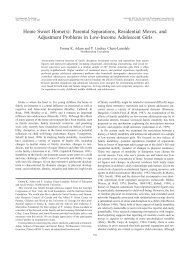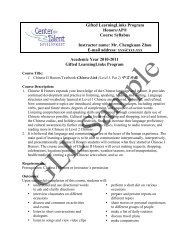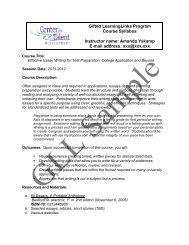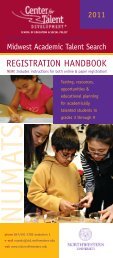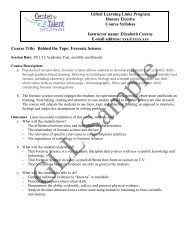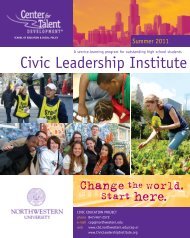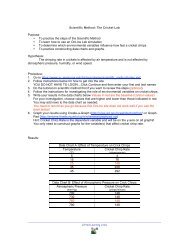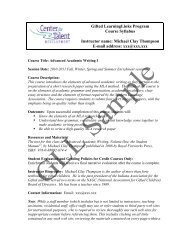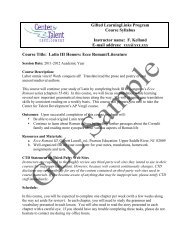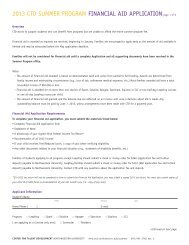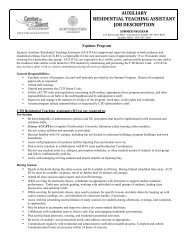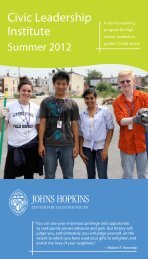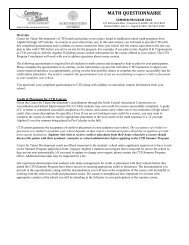2012 Summer Program - Center for Talent Development ...
2012 Summer Program - Center for Talent Development ...
2012 Summer Program - Center for Talent Development ...
- No tags were found...
Create successful ePaper yourself
Turn your PDF publications into a flip-book with our unique Google optimized e-Paper software.
110. Culinary Science & Nutrition: Eat toLive, Live to EatPrerequisite: full year Honors lab sciencecourseTop chefs work to create delicious, healthfulmenus using local, sustainable provisions.Medical researchers and healthproviders tout diet and nutrition as thefoundations of health and healing. Bothworlds come together as amateurresearcher-cooks learn the science andpractice of nutrition, the role it plays inprevention of disease, recent medicalbreakthroughs and research surroundingnutrition, and the art of creating andpreparing tasty, healthy meals. Participantsvisit local markets and restaurant kitchens,study with clinical nutritionists and cookwith master chefs. This course is perfect<strong>for</strong> students interested in the medical field,as well as students interested in learning tocook or in increasing their existing skills.Notes:• Additional $150 lab & materials feerequired.• Portions of this course take place offcampus; students are escorted to fieldstudysites.• Residential students are strongly encouragedto bring their own computer.Offered: Session 2Admission Criteria: SAT M ≥ 540; ACT M≥ 20; or Admission PortfolioHigh school credit offered: 1 semester111. Biology HonorsPrerequisite: completion of an Honors laboratoryscience courseBiology comes alive in this fast-pacedcourse, emphasizing the principles thatapply to plants and animals. As a supplementto class discussion, text readings, anddemonstrations, students spend class timein a laboratory per<strong>for</strong>ming experimentsand learning methods of scientific investigation.Biology Honors is designed <strong>for</strong>students who have the ability to acceleratein science. Students must be willing tocommit to the intense demands of masteringone year of biology in three weeks.This course prepares students <strong>for</strong> HumanBiology Honors, Genetics Honors and APBiology.Note: Additional $150 lab fee required.Offered: Session 1Admission Criteria: SAT V or Crit. R ≥510; ACT R ≥ 24; ACT S ≥ 22; orAdmission PortfolioHigh school credit offered: 2 semesters112. Biology (AP® designation pending)Prerequisite: One year of Honors BiologyHow do stem cells differentiate into adiverse range of cell types? In AP Biology,coursework is centered on three generalareas: molecules and cells; heredity andevolution; and organisms and populations.Students develop a framework <strong>for</strong> understandingmodern biology and engage inthe scientific process through lab experiments,readings, lecture, and discussion.AP Biology is designed to be the equivalentof an introductory, college-level biologycourse, and prepares students to takethe AP ® Biology test.Notes:• Additional $150 lab fee required.• Residential students are stronglyencouraged to bring their own computer.Offered: Session 2Admission Criteria: SAT V or Crit. R ≥510; ACT R ≥ 24; ACT S ≥ 22; orAdmission PortfolioHigh school credit offered: 2 semesters113. Human Biology HonorsPrerequisite: One year of Honors BiologyThis course covers the chemistry of cellularlife, cell structure and function, humanorganization, major systems of the humanbody, human and medical genetics, DNAand biotechnology, human evolution,ecology and population concerns.Students per<strong>for</strong>m dissections, as well asexperiments in molecular genetics, histologyand chemical composition of cells. Thiscourse is ideal <strong>for</strong> students interested inmedicine or veterinary science and providespreparation <strong>for</strong> AP Biology.Note: Additional $150 lab fee required.Offered: Session 1Admission Criteria: SAT V or Crit. R ≥510; ACT R ≥ 24; ACT S ≥ 22; orAdmission PortfolioHigh school credit offered: 1 semester114. Genetics HonorsPrerequisite: One year of Honors BiologyStudents build on their knowledge of biologyto investigate concepts and techniquesused to study human genetic qualities andtraits. Topics include molecular DNA,evolution of populations, Mendelianinheritance, as well as bioethical questionssuch as genetic engineering and stem cellresearch. Students learn how genetic in<strong>for</strong>mationis transmitted, circulated,arranged, and modified through basicprinciples of genetic research and laboratoryproblem solving.Notes:• Additional $150 lab fee required.• Residential students are stronglyencouraged to bring their own computer.Offered: Session 2Admission Criteria: SAT V or Crit. R ≥510; ACT R ≥ 24; ACT S ≥ 22; orAdmission PortfolioHigh school credit offered: 1 semester115. Neuroscience HonorsPrerequisite: One year of Honors BiologyStudents explore the complex systems ofthe human brain, drawing upon the interdisciplinaryprinciples of biology, chemistry,anatomy, physiology and psychology.Topics include neural systems and behavior;the embryonic development of thecentral and peripheral nervous systems;study of sensory and motor systems;changes in brain chemistry; aspects oflearning and memory; and disorders of thenervous system. In addition to lecture anddiscussion, students participate in laboratorydissections and experiments.Notes:• Additional $150 lab fee required.• Residential students are stronglyencouraged to bring their own computer.Offered: Session 1Admission Criteria: SAT V or Crit. R ≥510; ACT R ≥ 24; ACT S ≥ 22; orAdmission PortfolioHigh school credit offered: 1 semester847/491-3782 www.ctd.northwestern.edu NORTHWESTERN UNIVERSITY CENTER FOR TALENT DEVELOPMENT 41



